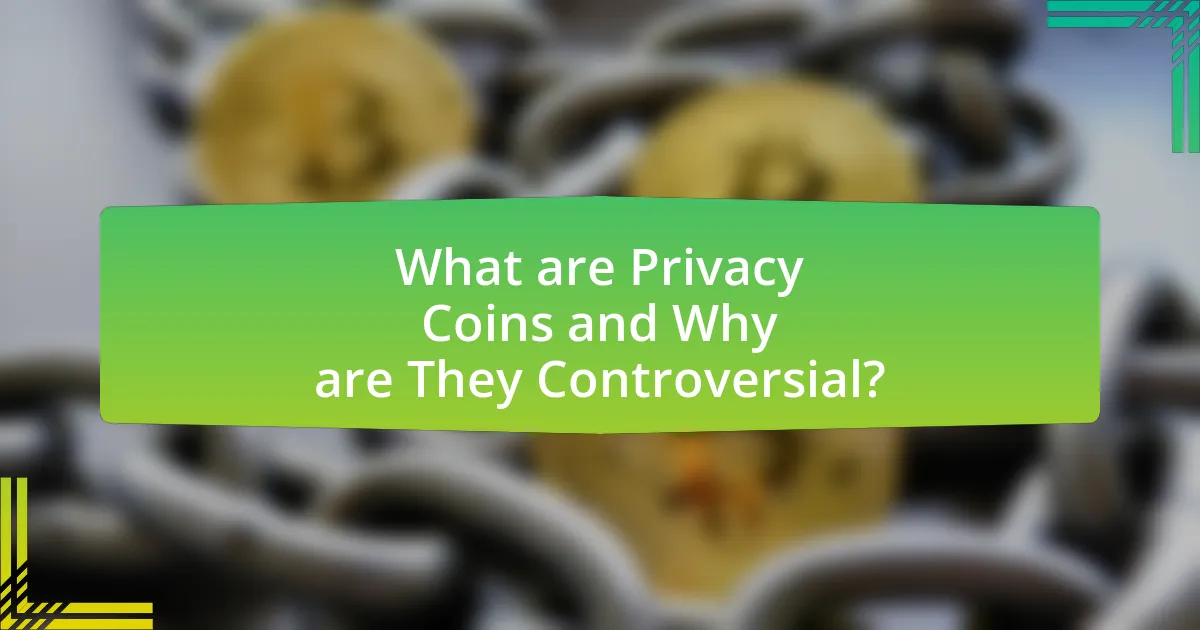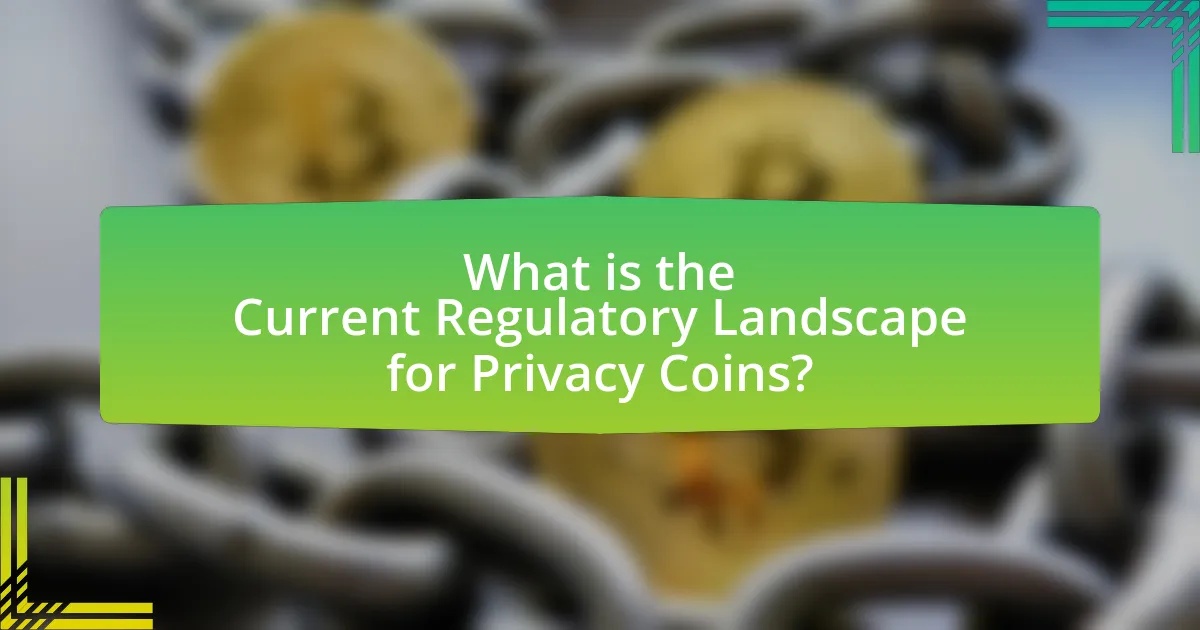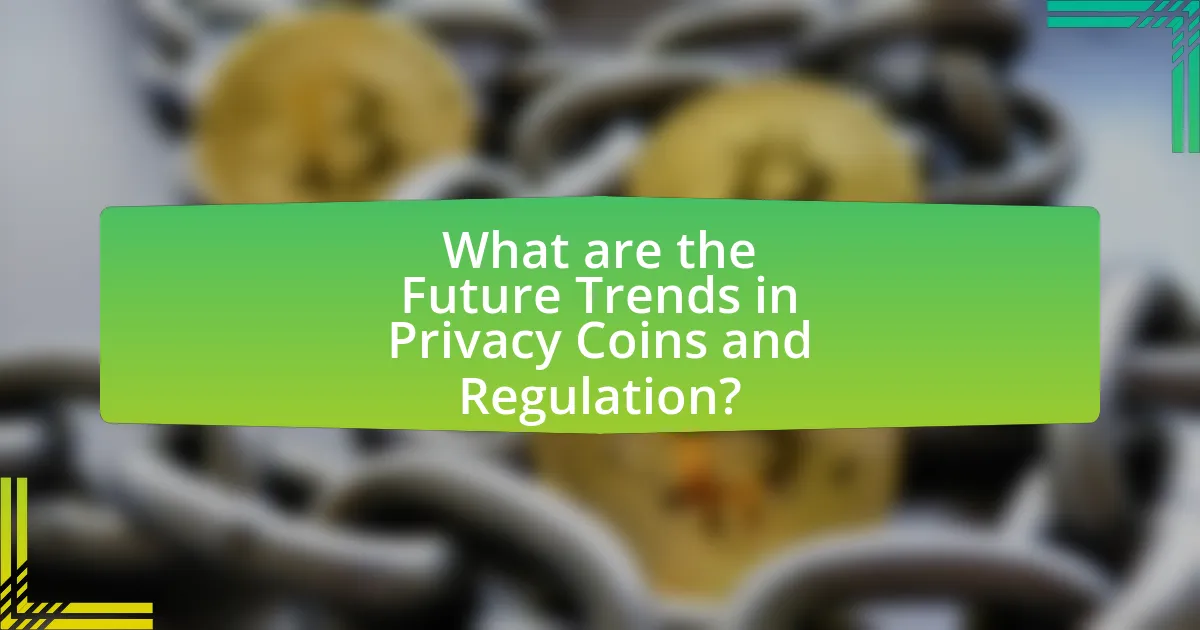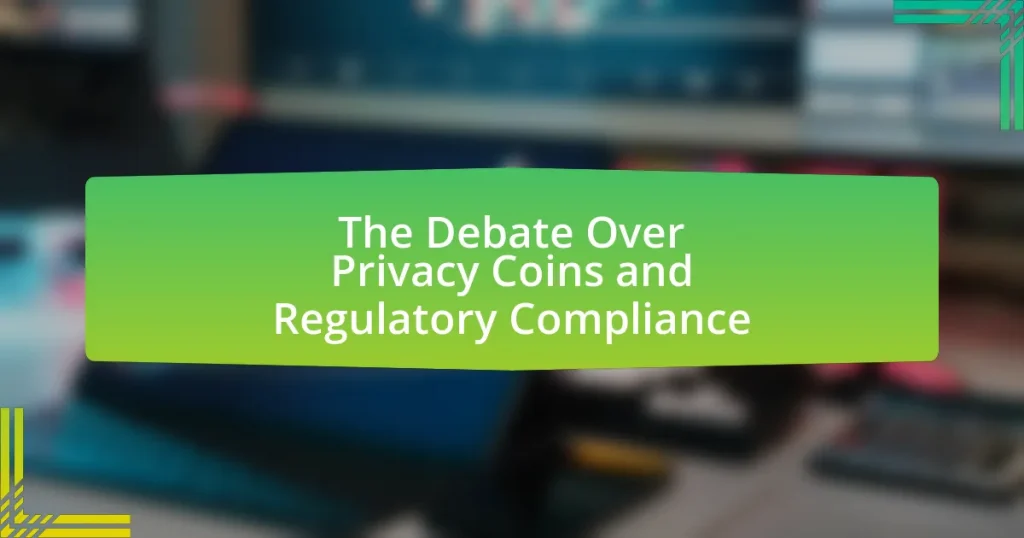Privacy coins are cryptocurrencies designed to enhance user anonymity and transaction confidentiality, employing advanced cryptographic techniques to obscure transaction details. This article explores the controversy surrounding privacy coins, such as Monero and Zcash, which are scrutinized for their potential to facilitate illicit activities like money laundering and tax evasion. It examines the differences between privacy coins and traditional cryptocurrencies, the technologies enabling their privacy features, and the regulatory landscape affecting their use globally. Additionally, the article discusses the implications of regulatory compliance for users, the risks of non-compliance, and best practices for navigating the complexities of privacy coin usage.

What are Privacy Coins and Why are They Controversial?
Privacy coins are cryptocurrencies designed to provide enhanced anonymity and privacy for users by obscuring transaction details. They are controversial because their features can facilitate illicit activities, such as money laundering and tax evasion, leading to regulatory scrutiny. For instance, coins like Monero and Zcash employ advanced cryptographic techniques to hide sender and receiver identities, which raises concerns among governments and financial institutions about their potential misuse. This tension between privacy rights and regulatory compliance fuels ongoing debates in the cryptocurrency community and among policymakers.
How do Privacy Coins differ from traditional cryptocurrencies?
Privacy coins differ from traditional cryptocurrencies primarily in their focus on enhancing user anonymity and transaction confidentiality. While traditional cryptocurrencies like Bitcoin and Ethereum allow for pseudonymous transactions, where addresses are visible on the blockchain, privacy coins such as Monero and Zcash employ advanced cryptographic techniques to obscure transaction details, including sender, receiver, and transaction amount. For instance, Monero uses ring signatures and stealth addresses to ensure that transactions cannot be traced back to individuals, making it significantly harder for third parties to analyze transaction patterns. This fundamental difference in privacy features has led to ongoing debates regarding regulatory compliance, as authorities express concerns over the potential use of privacy coins for illicit activities.
What technologies enable privacy features in these coins?
Privacy features in cryptocurrencies are primarily enabled by technologies such as zero-knowledge proofs, ring signatures, and stealth addresses. Zero-knowledge proofs allow one party to prove possession of certain information without revealing the information itself, enhancing transaction privacy. Ring signatures obscure the identities of senders by mixing their signatures with those of other users, making it difficult to trace transactions back to a specific individual. Stealth addresses generate unique, one-time addresses for each transaction, ensuring that the recipient’s address cannot be linked to their identity. These technologies collectively enhance user anonymity and transaction confidentiality, which are critical aspects of privacy coins like Monero and Zcash.
What are the most popular privacy coins currently in circulation?
The most popular privacy coins currently in circulation are Monero, Zcash, and Dash. Monero is widely recognized for its strong privacy features, utilizing ring signatures and stealth addresses to obscure transaction details. Zcash offers optional privacy through zk-SNARKs, allowing users to choose between transparent and shielded transactions. Dash, while primarily known for its speed and low transaction fees, also incorporates privacy features through its PrivateSend functionality. These coins are frequently discussed in the context of regulatory compliance due to their ability to facilitate anonymous transactions, raising concerns among regulators about potential misuse.
Why is there a debate surrounding the use of Privacy Coins?
The debate surrounding the use of Privacy Coins arises primarily from their potential to facilitate illicit activities while also providing legitimate users with enhanced financial privacy. Privacy Coins, such as Monero and Zcash, employ advanced cryptographic techniques to obscure transaction details, which can hinder law enforcement efforts to track money laundering, tax evasion, and other criminal activities. According to a report by the Financial Action Task Force (FATF), the anonymity provided by these coins poses significant challenges for regulatory compliance, prompting discussions on whether stricter regulations are necessary to mitigate risks while balancing the need for user privacy.
What concerns do regulators have regarding Privacy Coins?
Regulators are primarily concerned that Privacy Coins facilitate illicit activities such as money laundering and tax evasion due to their enhanced anonymity features. The lack of transparency in transactions makes it difficult for authorities to trace funds, which raises significant compliance issues with anti-money laundering (AML) and know-your-customer (KYC) regulations. For instance, the Financial Action Task Force (FATF) has highlighted that the use of Privacy Coins can undermine the effectiveness of global efforts to combat financial crimes, as they can obscure the identities of users and the origins of funds.
How do Privacy Coins impact financial transparency?
Privacy coins significantly reduce financial transparency by obscuring transaction details and user identities. Unlike traditional cryptocurrencies, which often allow for transaction tracing, privacy coins like Monero and Zcash utilize advanced cryptographic techniques to hide sender and receiver information, as well as transaction amounts. This lack of transparency can hinder regulatory efforts aimed at preventing money laundering and tax evasion, as authorities struggle to track illicit activities. For instance, a 2020 report by the Financial Action Task Force highlighted that the anonymity provided by privacy coins poses challenges for law enforcement agencies in monitoring financial flows.

What is the Current Regulatory Landscape for Privacy Coins?
The current regulatory landscape for privacy coins is characterized by increasing scrutiny and varying approaches across jurisdictions. Governments and regulatory bodies, such as the Financial Action Task Force (FATF), have expressed concerns about the potential use of privacy coins for illicit activities, leading to calls for stricter regulations. For instance, in the United States, the Financial Crimes Enforcement Network (FinCEN) has proposed rules that would require exchanges to collect and report information on transactions involving privacy coins. Similarly, the European Union is considering regulations that would impose stricter anti-money laundering (AML) requirements on cryptocurrency transactions, including those involving privacy coins. These developments indicate a trend towards tighter regulation aimed at enhancing transparency and compliance in the cryptocurrency space.
How are different countries approaching the regulation of Privacy Coins?
Different countries are approaching the regulation of Privacy Coins with varying degrees of acceptance and restriction. For instance, the United States has taken a cautious stance, emphasizing compliance with anti-money laundering (AML) and know-your-customer (KYC) regulations, while the Financial Crimes Enforcement Network (FinCEN) has issued guidance indicating that Privacy Coins may be subject to stricter scrutiny. In contrast, countries like Japan have embraced a more regulated framework, recognizing Privacy Coins but requiring exchanges to register and comply with local laws. Meanwhile, nations such as China have outright banned the use of Privacy Coins, citing concerns over financial stability and illicit activities. This diverse regulatory landscape reflects each country’s unique approach to balancing innovation in cryptocurrency with the need for security and compliance.
What are the key regulatory frameworks affecting Privacy Coins globally?
Key regulatory frameworks affecting Privacy Coins globally include the Financial Action Task Force (FATF) guidelines, the European Union’s Fifth Anti-Money Laundering Directive (5AMLD), and various national regulations such as the United States’ Bank Secrecy Act (BSA) and the UK’s Proceeds of Crime Act. The FATF guidelines, established in 2019, require countries to implement measures that ensure virtual asset service providers (VASPs) conduct customer due diligence and report suspicious activities, directly impacting the use of Privacy Coins. The 5AMLD, effective since January 2020, mandates that cryptocurrency exchanges and wallet providers register with authorities and comply with anti-money laundering (AML) regulations, further constraining the operational landscape for Privacy Coins in Europe. In the U.S., the BSA requires financial institutions to report transactions exceeding a certain threshold, which affects Privacy Coin transactions, while the UK’s Proceeds of Crime Act allows for the seizure of assets linked to criminal activity, including those involving Privacy Coins. These frameworks collectively shape the regulatory environment for Privacy Coins, influencing their adoption and usage worldwide.
How do these regulations vary between jurisdictions?
Regulations regarding privacy coins vary significantly between jurisdictions, reflecting differing legal frameworks and policy priorities. For instance, in the European Union, privacy coins are subject to stringent anti-money laundering (AML) regulations, requiring exchanges to implement know-your-customer (KYC) protocols, while countries like Japan have embraced a more permissive stance, allowing privacy coins under specific conditions. In the United States, regulations differ by state; some states impose strict regulations on privacy coins, while others have more lenient approaches, leading to a patchwork of compliance requirements. This variation is influenced by factors such as local economic interests, public sentiment towards privacy, and the perceived risks associated with anonymity in financial transactions.
What are the implications of regulatory compliance for Privacy Coin users?
Regulatory compliance significantly impacts Privacy Coin users by imposing restrictions that can limit their anonymity and usage. As governments worldwide increasingly scrutinize cryptocurrencies, Privacy Coin users may face challenges such as mandatory identity verification and transaction monitoring, which undermine the core purpose of privacy-focused cryptocurrencies. For instance, the Financial Action Task Force (FATF) has recommended that countries enforce regulations requiring exchanges to collect user information, which directly affects how Privacy Coins can be traded and utilized. This regulatory landscape can lead to reduced adoption of Privacy Coins, as users may seek alternatives that offer greater anonymity in light of compliance pressures.
What risks do users face if they do not comply with regulations?
Users face significant risks if they do not comply with regulations, including legal penalties, financial losses, and reputational damage. Non-compliance can lead to fines imposed by regulatory bodies, which can reach millions of dollars depending on the severity of the violation. For instance, the Financial Crimes Enforcement Network (FinCEN) has levied fines against companies for failing to adhere to anti-money laundering (AML) regulations. Additionally, users may experience account freezes or closures by financial institutions that enforce compliance measures. Furthermore, non-compliance can result in increased scrutiny from law enforcement agencies, potentially leading to criminal charges. The overall impact can severely undermine user trust and market stability, as evidenced by the decline in user engagement with platforms that have faced regulatory actions.
How can users ensure compliance while using Privacy Coins?
Users can ensure compliance while using Privacy Coins by adhering to local regulations, conducting thorough due diligence, and utilizing transparent practices. Compliance requires users to understand the legal framework governing cryptocurrencies in their jurisdiction, which may include Know Your Customer (KYC) and Anti-Money Laundering (AML) regulations. Engaging with exchanges that implement KYC processes and maintaining accurate records of transactions can further support compliance efforts. Additionally, users should stay informed about evolving regulations and best practices in the cryptocurrency space to mitigate risks associated with non-compliance.

What are the Future Trends in Privacy Coins and Regulation?
Future trends in privacy coins and regulation indicate a growing scrutiny from governments and regulatory bodies, leading to potential restrictions on their use. As privacy coins like Monero and Zcash gain popularity for their anonymity features, regulators are increasingly concerned about their potential for facilitating illicit activities. For instance, the Financial Action Task Force (FATF) has emphasized the need for compliance with anti-money laundering (AML) and combating the financing of terrorism (CFT) regulations, which may result in stricter guidelines for privacy coins. Additionally, advancements in blockchain analytics technology are likely to enhance the ability of authorities to trace transactions, further pushing privacy coins towards either increased compliance or adaptation to remain viable.
How might the regulatory landscape evolve in the coming years?
The regulatory landscape is likely to evolve towards stricter compliance measures for privacy coins in the coming years. Governments and regulatory bodies are increasingly focusing on enhancing transparency and preventing illicit activities associated with cryptocurrencies, as evidenced by the Financial Action Task Force (FATF) guidelines that emphasize the need for virtual asset service providers to implement robust anti-money laundering (AML) and know-your-customer (KYC) protocols. Additionally, countries like the United States and members of the European Union are actively drafting legislation aimed at regulating digital assets, which may include specific provisions targeting privacy coins to ensure they align with existing financial regulations. This trend indicates a shift towards a more controlled environment where privacy coins may face significant scrutiny and potential restrictions to mitigate risks associated with their use.
What technological advancements could influence Privacy Coin regulation?
Technological advancements such as zero-knowledge proofs, enhanced cryptographic algorithms, and decentralized identity solutions could significantly influence Privacy Coin regulation. Zero-knowledge proofs allow transactions to be verified without revealing the underlying data, which can challenge regulatory frameworks that require transparency. Enhanced cryptographic algorithms improve the security and anonymity of transactions, making it difficult for regulators to trace activities. Additionally, decentralized identity solutions can provide users with control over their personal information, complicating compliance with regulations that mandate identity verification. These advancements create a landscape where traditional regulatory approaches may struggle to keep pace, necessitating new frameworks that address the unique characteristics of Privacy Coins.
How might user adoption of Privacy Coins affect regulatory approaches?
User adoption of Privacy Coins may lead to stricter regulatory approaches as governments seek to mitigate risks associated with financial anonymity. Increased usage of these coins can raise concerns about money laundering, tax evasion, and funding of illicit activities, prompting regulators to implement more comprehensive frameworks. For instance, the Financial Action Task Force (FATF) has emphasized the need for jurisdictions to regulate virtual assets, including Privacy Coins, to ensure compliance with anti-money laundering (AML) and counter-terrorism financing (CTF) standards. As user adoption grows, regulators may also enhance monitoring and reporting requirements for exchanges and service providers dealing with these assets, reflecting a proactive stance to address potential threats to financial integrity.
What best practices should users follow when engaging with Privacy Coins?
Users engaging with Privacy Coins should prioritize anonymity, security, and compliance with local regulations. To maintain anonymity, users should utilize wallets that do not require personal information and consider using mixing services to obfuscate transaction trails. Security can be enhanced by employing strong passwords, enabling two-factor authentication, and keeping software updated to protect against vulnerabilities. Compliance with local regulations is crucial; users should stay informed about the legal status of Privacy Coins in their jurisdiction to avoid potential legal issues. For instance, the Financial Action Task Force (FATF) has issued guidelines that emphasize the importance of compliance in cryptocurrency transactions, highlighting the need for users to understand their responsibilities.
How can users stay informed about regulatory changes affecting Privacy Coins?
Users can stay informed about regulatory changes affecting Privacy Coins by regularly following updates from reputable financial regulatory bodies, cryptocurrency news websites, and legal analysis platforms. Regulatory bodies such as the Financial Action Task Force (FATF) and the U.S. Securities and Exchange Commission (SEC) frequently publish guidelines and updates that impact the status of Privacy Coins. Additionally, platforms like CoinDesk and CoinTelegraph provide timely news articles and expert opinions on regulatory developments. Engaging with community forums and social media channels dedicated to cryptocurrency can also offer insights and discussions on emerging regulations.
What strategies can users employ to navigate the complexities of Privacy Coin usage?
Users can employ several strategies to navigate the complexities of Privacy Coin usage, including thorough research, utilizing privacy-focused wallets, and staying informed about regulatory changes. Conducting comprehensive research allows users to understand the specific features and risks associated with different Privacy Coins, such as Monero and Zcash, which utilize advanced cryptographic techniques to enhance anonymity. Utilizing privacy-focused wallets, like Wasabi or Samourai, can help users maintain their privacy by implementing features such as coin mixing and transaction obfuscation. Additionally, staying informed about regulatory changes is crucial, as jurisdictions may impose varying compliance requirements that could affect the legality and usability of Privacy Coins. For instance, the Financial Action Task Force (FATF) has issued guidelines that impact how cryptocurrencies, including Privacy Coins, are regulated globally, emphasizing the need for users to remain vigilant and adaptable.






